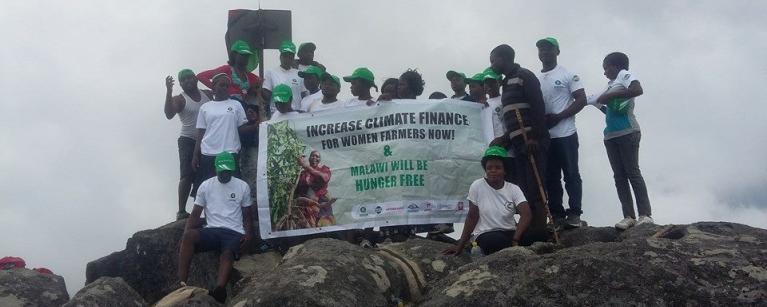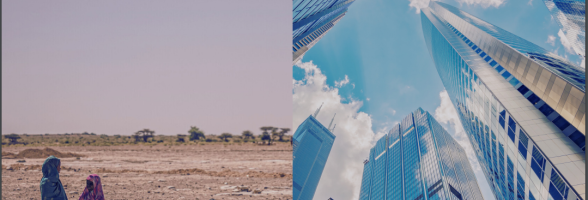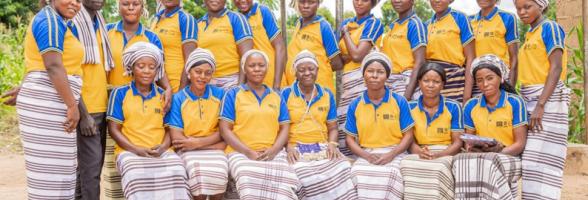Alice Kachere is a Lilongwe based rural woman farmer and chairperson of Rural Women’s Assembly (RWA) Malawi Chapter. In 2015, Alice was among three Malawian rural women farmers that summited the 3002 meters Mount Mulanje to raise their voice on the impact of climate change on women farmers through the Oxfam’s Women Food Climate campaign.
Weeks later, she rallied her two colleagues to conquer Mount Kilimanjaro amplifying their voices for change.
Despite this and Eight years down the line, Alice says by now she had hoped things would be better. She is displeased with the slow, insensitive, and inadequate gender-blind support rural farmers like her are getting from global leaders.
“I am far from being happy, climate change demands more than blankets and buckets when we are hit by floods”, says Alice. “We need support that would enable us grow food again without depending on chemicals that are damaging our environment and bodies.”
“Climate financing must go beyond responding to climate related disasters, but they must also support rural women to embrace agroecology”.
Alice’s sentiments and calls if worked could be a catalyst for change not just in Malawi but globally. Many women who are on the frontline of producing food grapple with unforgiving and devastating impacts of climate change impacts, robbing them of their ability to even produce food for their families.
In Malawi, Oxfam through the Gender Transformative Climate Resilience Project funded by the African Development Bank are working with women’s local movements like Rural Women Assemblies (RWA) to support women and amplify their voices. The 2 year project is being implemented in Malawi’s southern eastern district of Zomba.
The project seeks to foster a paradigm shift towards improved gender equity, low carbon practices, and climate resilience in targeted vulnerable communities, with a special focus on empowering women.
Oxfam recognises that women are disproportionally affected by different crises’ including the effects of climate change. Their leadership and their stories therefore illuminate diverse solutions that are rooted in sustainability". From Grassroots to Sky: Women at the Forefront of Local Climate Movements explores the bottom-up approaches Malawi is using to empower local women affected by the effects of climate change in Zomba.
Rural Women Assemblies (RWA): Platforms for Change ahead of the COP 28.
Developed by farming communities, RWA are powerful platforms for farmers where voices directly affected by climate change are heard. This grassroots engagement aligns seamlessly with Oxfam's commitment to empower rural leaders to actively contribute their voices and perspectives to critical issues, particularly in the realm of climate change. As we mark COP 28, Oxfam's holistic and inclusive strategy exemplifies a model of sustainable development that champions the agency of those most impacted by environmental challenges, particularly women.
During the recently held assembly, Alice and her fellow women farmers presented their asks ahead of COP28 on climate financing, gender and climate justice, and Agriculture and forestry.
Key asks on Climate Financing
The Rural Women’s Assembly advocated for climate financing, a vital aspect before, during and after disasters. The following key requests were made to the Ministry of Natural Resources and Climate Change:
- The efficient allocation of funds climate change interventions was a key asks that was made during the RWA’s. Women and girls are the most impacted by disasters, and historic trends have shown that individuals grappling with the effects of disasters were mostly women and marginalized populations including persons living with disabilities. This exclusion was noted during the response phases. The prioritization of climate financing in the form of climate SMART Social Cash Transfers deliberately targeting rural women affected by disasters is essential, recognizing their disproportionate vulnerability to disasters.
- Long-term preparations should address the needs of internally displaced people, emphasizing WASH facilities and essential services.
- Developed countries must contribute significantly to developing nations for climate change issues, adhering to the "Polluters must pay" principle.
- Organizations must engage with key community figures for accurate identification of affected individuals, and funding should prioritize women empowerment initiatives. Transparent and accountable implementation, monitored at national, district, and community levels, is imperative during these exercises.
- Incorporating Gender-Based Violence programming into climate financing is essential to mitigate issues like sexual harassment and early marriages.
- Capacity building of local households for adaptation initiatives should be a focal point in climate finance considerations.
Key asks on Gender and Climate Justice
- Climate Change related response projects should consider specific gender needs e.g., sexual reproductive services such as family planning methods in camps and provision of reusable sanitary pads during response interventions.
- There should be equal representation of both men and women in decision making processes on climate change related issues in the community.
- Climate Funds should be put in place to address intersecting issues that arise because of disasters, which impact specific groups of people, especially children and women.
Key asks on Food and Agriculture
- Climate Change Interventions should consider commercially viable projects that deliberately targets women likesmall- scale solar pump irrigation for women in agriculture
- Agriculture climatic interventions should consider exempting hard collateral arrangements which uses individual household assets as collaterals favouring collective groups and cooperatives
- Target small holder farmers in rural communities. One of the FDG indicated and was quoted, ‘most of the support in agriculture provided by government and other institutions mostly target large scale farmers who are in schemes, not an ordinary farmer in a village and this has disadvantaged us, for example people in schemes recently have received fertilizers from agriculture offices in our areas’
- Climate Change Adaptation and technologies should be intensified, e.g., water harvesting techniques such as check dams to avoid and prevent floods.
- Mechanization of agriculture farming by the youth should be promoted in local communities.
- Introducing fish farming should be considered since most of the communities have already have fishponds or dam in their localities.
- Climate adaptation interventions should consider intensifying livestock productions such as goats and chicken’s distributions which serves multiple functions such as manure production, subsistence, and commercial purposes.
- Funds should consider promoting of agro ecology farming in rural areas
For Alice and many rural women farmers, a COP meeting that will not address the above issues will go down in history as another talk show serving the interests of polluters and not affected farmers, especially women. No gender justice without climate justice. Global leaders at COP must appreciate that women’s farmers grassroots efforts radiate beyond their immediate surroundings, which aims to shape a more inclusive and sustainable future for our planet. As we mark UN Climate Change Conference (UNFCCC- COP 28) it is imperative that the needs on women at the grassroots level are known as they illuminate the diverse ways in which women contribute to the collective effort.


